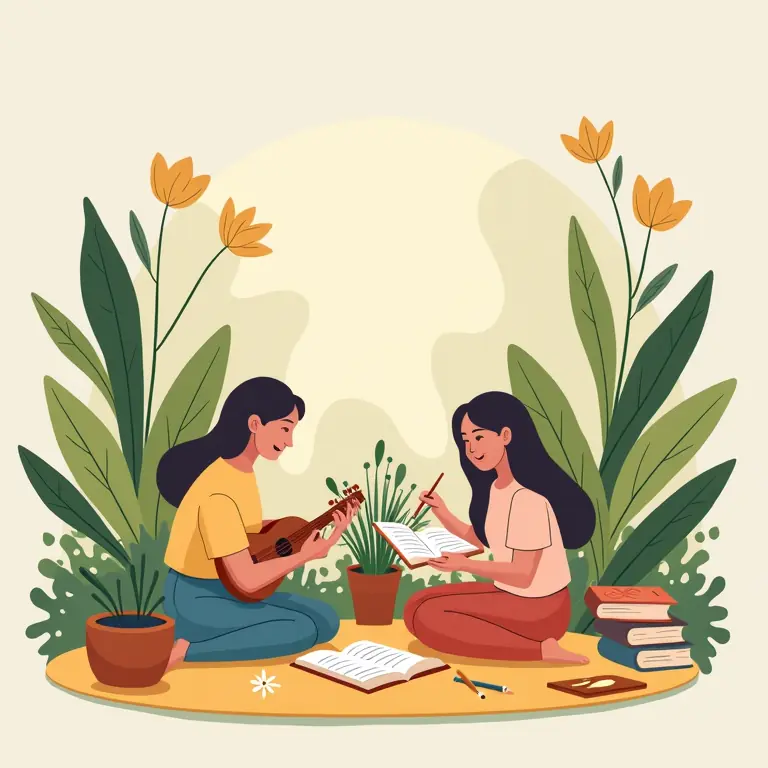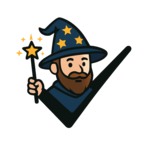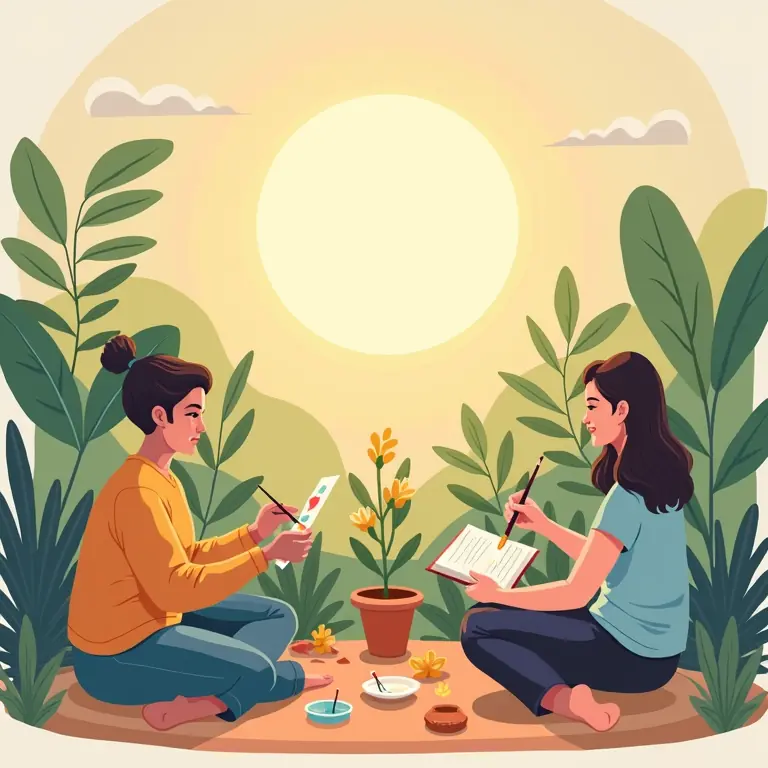Decode Your Downtime: A Friendly Guide to Mindful Hobby Selection
We all have downtime. Those pockets of hours, minutes, or even just moments between obligations, tasks, and the general demands of life. For many, this downtime is filled with mindless scrolling, passive entertainment, or simply… nothing. While there’s nothing inherently *wrong* with relaxing, consistently unproductive downtime can leave us feeling depleted, unfulfilled, and even a little lost. This guide is about reclaiming that time, not with more ‘shoulds’ or pressure, but with mindful hobby selection – finding activities that genuinely nourish your mind, body, and soul.
Why Mindful Hobby Selection Matters
Before diving into *what* hobbies to choose, let’s explore *why* it matters. It goes beyond simply “having something to do.” Here’s a breakdown:
- Combating Burnout: Burnout isn’t just about being overworked. It’s about a lack of control, a feeling of being overwhelmed, and a depletion of emotional resources. Hobbies offer a space for agency, creativity, and a break from the pressures of work or daily life.
- Boosting Mental Wellbeing: Engaging in enjoyable activities releases dopamine, a neurotransmitter associated with pleasure, motivation, and learning. Hobbies can reduce stress, anxiety, and even symptoms of depression.
- Cultivating Flow State: Flow, that feeling of being completely immersed in an activity, is incredibly rewarding. Hobbies provide opportunities to experience flow, which is linked to increased happiness and productivity.
- Personal Growth: Many hobbies involve learning new skills, challenging yourself, and expanding your knowledge. This fosters personal growth and a sense of accomplishment.
- Social Connection (Optional): Some hobbies are solitary, which can be incredibly restorative. Others offer opportunities for social interaction and building community.
Essentially, mindful hobby selection is an act of self-care. It’s about intentionally carving out space for activities that contribute to your overall wellbeing.
Understanding Your ‘Downtime Personality’
Not everyone approaches downtime the same way. Identifying your “downtime personality” can help you choose hobbies that truly resonate. Consider these archetypes:
- The Restorative Recharge: You need downtime to *recover*. Your battery drains quickly, and you prefer activities that are calming, quiet, and require minimal effort. Think reading, listening to music, spending time in nature, or taking a long bath.
- The Creative Explorer: Downtime is an opportunity to express yourself and explore your creativity. You thrive on making things, whether it’s painting, writing, playing music, or coding.
- The Skill Seeker: You enjoy learning new things and challenging yourself. Downtime is a chance to expand your knowledge and acquire new skills. This could involve taking online courses, learning a new language, or mastering a complex game.
- The Social Butterfly: You recharge through social interaction. Downtime is best spent with friends and family, engaging in activities you enjoy together. Think board games, group sports, or volunteering.
- The Purposeful Pursuer: You feel most fulfilled when your time is used in a meaningful way. Downtime is an opportunity to contribute to something larger than yourself, such as volunteering, activism, or working on a passion project.
You may find you identify with a combination of these archetypes. The goal isn’t to pigeonhole yourself, but to gain a better understanding of your needs and preferences.
A Spectrum of Hobby Ideas (Categorized)
Now, let’s get to the fun part: exploring hobby ideas! This is a broad list, broken down into categories. Remember, the “best” hobby is the one you’ll actually *do*.

Creative & Artistic Hobbies
- Painting/Drawing: Acrylics, watercolors, oils, sketching – the possibilities are endless.
- Writing: Fiction, poetry, journaling, blogging.
- Music: Learning an instrument, singing, songwriting, DJing.
- Photography: Capturing moments, experimenting with composition, editing.
- Sculpting/Pottery: Working with clay, wood, or other materials to create three-dimensional art.
- Digital Art: Graphic design, illustration, animation.
- Calligraphy/Lettering: The art of beautiful handwriting.
- Crafting: Knitting, crocheting, sewing, embroidery, quilting, jewelry making, candle making, soap making.
Intellectual & Learning Hobbies
- Reading: Fiction, non-fiction, poetry, graphic novels – explore different genres and authors.
- Learning a New Language: Duolingo, Babbel, Rosetta Stone, or language exchange partners.
- Coding/Programming: Python, JavaScript, HTML/CSS – build websites, apps, or games.
- Puzzles: Sudoku, crosswords, jigsaw puzzles, logic puzzles.
- Chess/Board Games: Strategic thinking and social interaction.
- Astronomy: Observing the night sky, learning about constellations and planets.
- History/Genealogy: Researching your family tree or exploring historical events.
- Online Courses: Coursera, edX, Udemy – learn new skills from experts in various fields.
Physical & Outdoor Hobbies
- Walking/Hiking: Exploring nature, getting exercise, enjoying fresh air.
- Running/Jogging: Improving cardiovascular health, setting fitness goals.
- Cycling: A great way to commute, explore your surroundings, and get exercise.
- Swimming: A full-body workout that’s gentle on the joints.
- Yoga/Pilates: Improving flexibility, strength, and mindfulness.
- Gardening: Growing your own food, creating a beautiful outdoor space.
- Rock Climbing/Bouldering: A challenging and rewarding physical activity.
- Team Sports: Basketball, soccer, volleyball – social interaction and exercise.
Collecting & Restoring Hobbies
- Stamp Collecting: A classic hobby with a rich history.
- Coin Collecting: Exploring numismatics and collecting rare coins.
- Vintage Toys/Collectibles: Nostalgia and the thrill of the hunt.
- Book Collecting: First editions, signed copies, or books on a specific topic.
- Restoring Furniture: Bringing old pieces back to life.
- Model Building: Cars, planes, trains, or historical structures.
Digital & Gaming Hobbies
- Video Games: Exploring different genres, playing with friends, or participating in esports.
- Streaming: Sharing your gameplay or creative content with others.
- Podcasting: Creating and sharing audio content on a topic you’re passionate about.
- Blogging/Vlogging: Sharing your thoughts, experiences, or expertise online.
- Digital Photography/Videography: Editing and creating visual content.
The ‘Trial Period’ & Avoiding Hobby Overload
Don’t feel pressured to find the “perfect” hobby immediately. Experiment! Treat each potential hobby like a trial period. Give it a fair chance – a few weeks or even a month – before deciding if it’s a good fit. Don’t be afraid to try something new, even if it seems outside your comfort zone.
Avoid Hobby Overload: It’s tempting to jump into multiple hobbies at once, but this can lead to overwhelm and burnout. Start with one or two and gradually add more as you feel comfortable. Prioritize quality over quantity.
Integrating Downtime into Your Schedule
Mindful hobby selection is only half the battle. You also need to *schedule* downtime into your life. This isn’t about adding another task to your to-do list; it’s about protecting your wellbeing.
- Time Blocking: Allocate specific blocks of time in your calendar for hobbies.
- Micro-Moments: Even short bursts of downtime can be beneficial. Take a 5-minute break to read a book, listen to music, or practice mindfulness.
- Saying “No”: Learn to politely decline commitments that don’t align with your priorities.
- Unplugging: Disconnect from technology regularly to reduce distractions and create space for relaxation.
Consider checking out this guide on optimizing your everyday settings to help minimize distractions and make more time for mindful activities.
The Importance of Flexibility & Self-Compassion
Life happens. Sometimes you’ll have more downtime than others. Sometimes you’ll feel motivated to pursue your hobbies, and sometimes you won’t. Be flexible and compassionate with yourself. Don’t beat yourself up if you miss a scheduled hobby session or if you lose interest in an activity. The goal is to find activities that *enhance* your life, not add another source of stress.

D&D Downtime: A Specific Example
For those who enjoy tabletop role-playing games like Dungeons & Dragons, “downtime” within the game itself is a valuable mechanic. It allows characters to recover, train skills, and engage in activities that contribute to their story. But the concept extends beyond the game. Taking time *between* sessions to prepare, create characters, or reflect on the campaign can be just as rewarding.
Thinking about downtime in a similar way – as a period of restoration and preparation – can be applied to your everyday life.
Beyond the Hobby: Creating a Downtime Ritual
Consider creating a small ritual around your downtime. This could involve making a cup of tea, lighting a candle, putting on calming music, or simply finding a comfortable spot to relax. Rituals signal to your brain that it’s time to switch gears and enter a state of relaxation.
Your Workspace and Downtime
Believe it or not, your workspace can significantly impact your ability to enjoy downtime. A cluttered, stressful environment can make it difficult to relax and unwind. Creating a dedicated space for your hobbies, or simply decluttering your workspace, can help you create a more conducive environment for relaxation.
For more on optimizing your workspace, check out this guide to workspace ergonomics.
Revisiting Your Choices & Adapting Over Time
Your interests and needs will change over time. What you enjoy today might not be what you enjoy tomorrow. Regularly revisit your hobby choices and be willing to adapt. Don’t be afraid to let go of hobbies that no longer serve you and explore new ones. The process of mindful hobby selection is an ongoing journey, not a destination.
To help you further refine your approach to downtime, take a look at this article about decoding your downtime, offering more insights and practical tips.
Final Thoughts
Downtime isn’t a luxury; it’s a necessity. By intentionally selecting hobbies that nourish your mind, body, and soul, you can transform those empty pockets of time into opportunities for growth, joy, and wellbeing. So, take a deep breath, explore your interests, and start decoding your downtime today!


Discussion about this post